You’ve bought a bottle or two of Kombucha to give it a try. Now you find that one of them still sits in storage. Can kombucha go bad?
Or maybe yours isn’t past its date, but there’s this weird sediment on the bottom of the bottle, or a jelly-like thing floating in the bottle. And at this point, you’re pretty sure this probiotic-rich drink has gone bad, but you want to make sure.
If either is the case, you’re in the right place. And if the latter is true, don’t pour that kombucha down the drain just yet. Chances are, it’s still okay to drink.
Want to learn more about storage, shelf life, and spoilage of kombucha? Read on.

Can Kombucha Go Bad? How To Tell If Kombucha Is Bad?
Telling if kombucha is off is a bit tricky.
It’s a fermented product and therefore quite acidic. That means any microorganism that isn’t already there has a hard time living and growing in such an environment.
Because of that, the beverage lasts a long time and doesn’t spoil easily. However, in some rare cases, things may go south.
The first and most obvious sign of spoilage is the presence of mold. It’s rare and happens mostly with homemade kombucha or an old one that developed its own baby SCOBY (more on that below) on top, and mold started growing on it. If there’s mold, throw it out.
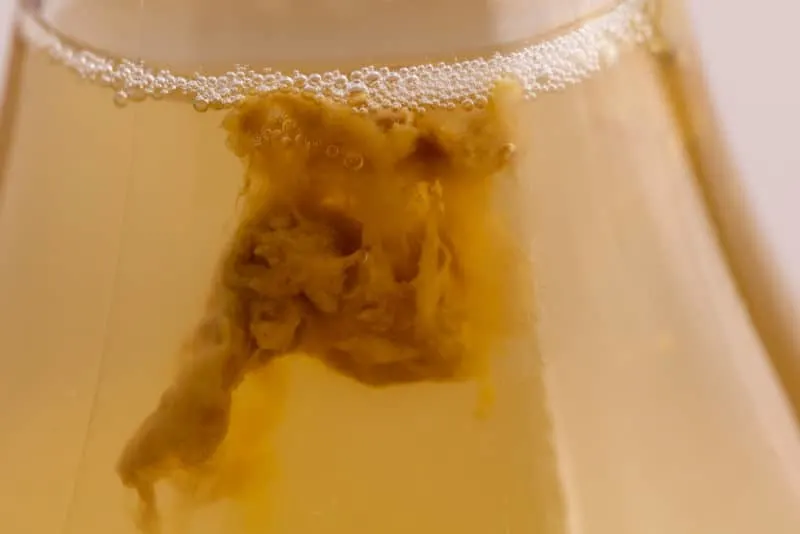
The second option is that your kombucha has turned vinegary in taste ([NE]) and you don’t find it good enough to drink anymore. This is a natural result of fermentation and happens to kombucha that’s refrigerated for months or sits on the counter for a couple of weeks or so.
If your kombucha tastes too acidic to drink, you can use it as a vinegar substitute instead of throwing it out.
If it starts to smell off after a few days of opening, and you tend to drink it directly from the bottle, switch to using glasses.
There’s most likely nothing wrong with the drink, but the bacteria from your mouth have contaminated the neck of the bottle, and that’s what’s causing the smell.
If you’re always using a glass and your kombucha stinks, discard it.
That’s about it when it comes to signs of bad kombucha.
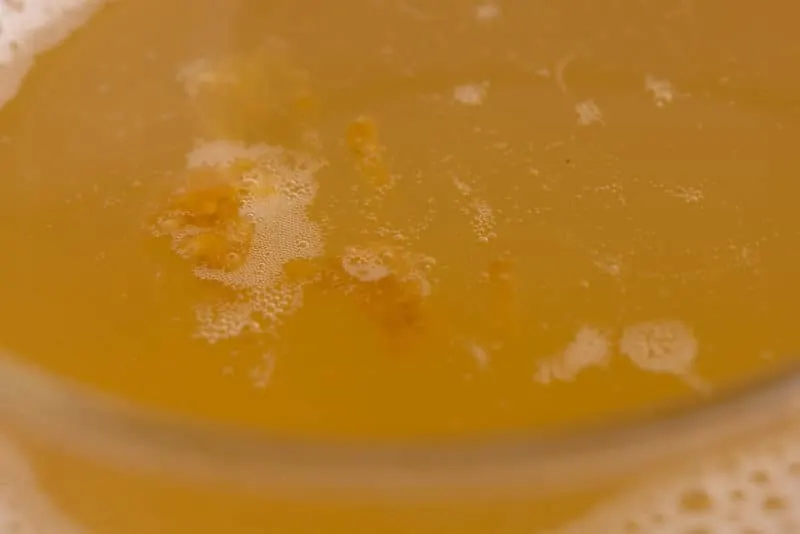
There are also at least a few things people find concerning which are perfectly normal for the probiotic drink. Here they are:
- Fizz or lack of it. Kombucha is a living thing, and the presence or absence of fizz depends on the batch, storage conditions, and how long it’s stored. Even if you always buy the same brand and store it the same way, the effervescence will vary ([GTS][NE]).
- Floaties in the bottle. The gel-like thing or a bunch of strands forming in the liquid is a baby SCOBY (Symbiotic Colony Of Bacteria and Yeast). A scoby is used in the process of making kombucha, and it can form on its own over time even if it was filtered out before bottling. Think of it like the mother forming in vinegar. It’s safe to consume it, but if you find it gross, just filter it out using a coffee filter ([CK][GTS][NE]).
- Sediment. Some sediment on the bottom is nothing unusual. If you want to mix it up, tilt the bottle gently left and right. Do not shake it, or it might explode like champagne ([GTS][RK][NE]).
Once again, all of the things above are perfectly normal.
Now that you know all about what is and what isn’t spoiled kombucha, let’s talk about its shelf life.
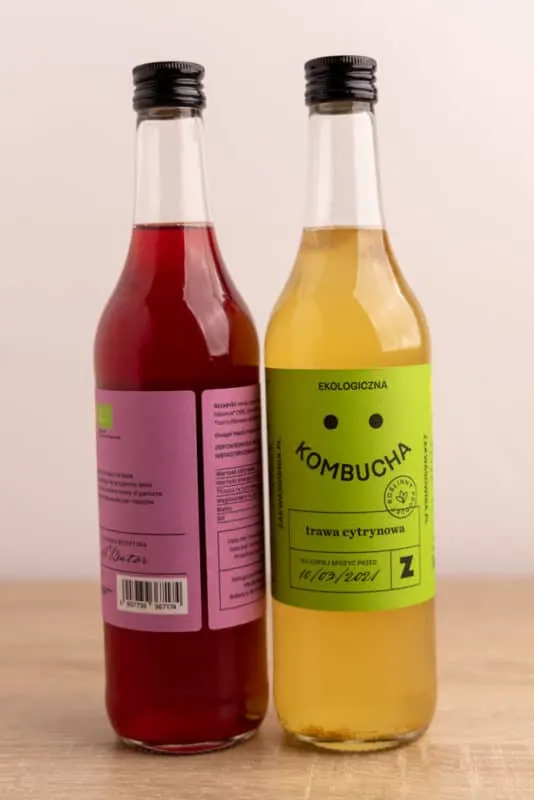
How Long Does Kombucha Last?
Kombucha retains quality between a couple of months to maybe a year, depending on the brand that you buy. Most kombuchas maintain flavor for a few weeks past their date, but sooner or later most of them go acidic.
Unfortunately, I cannot give you a simple time frame, as it all depends on the producer. It usually varies between a couple of months, to possibly a year ([CK]). The industry standard seems to be about 6 months from bottling ([CK][RK]).
As you already know, kombucha doesn’t easily go bad, so it’s not like it will magically go off after a week or two after the date on the label.
The date on the label is merely an estimate of how long the quality should be good enough for drinking. It has little to do with food safety.
In kombucha, the fermentation process is ongoing, like in unpasteurized sauerkraut, and the change of flavor is gradual. So it’s not like one day it will be perfectly fine and turn awful the next morning.
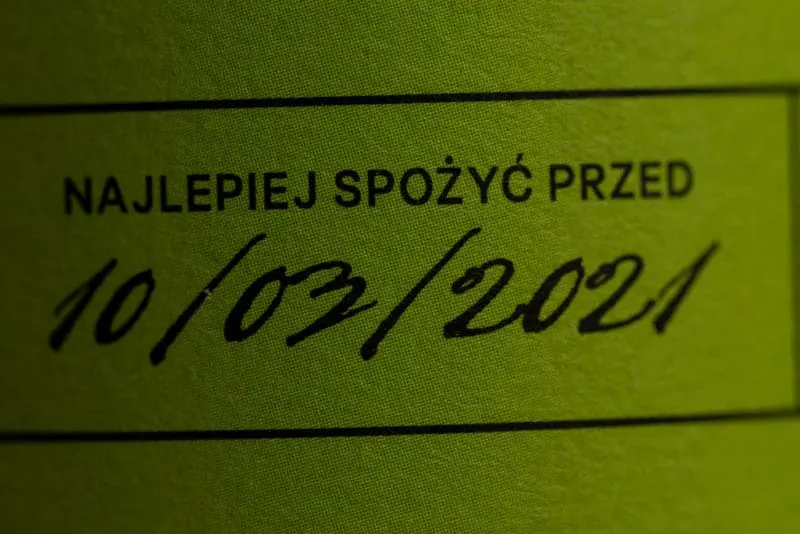
But at a certain point, you will notice that the flavor no longer hits the spot, and that’s when it’s time to either discard it or use it for other purposes ([NE]).
Obviously, it depends on your preferences. There are no hard and fast rules if that happens near the best-by date or a couple of weeks (or months) past it. Furthermore, varies between batches, so even if you’re loyal to a single brand, this period will vary.
One thing is certain, kombucha isn’t soda that often stays perfectly tasty even a couple of years past its date.
As long as the kombucha doesn’t show any signs of spoilage covered earlier, drink a tiny amount, and decide if you find it good enough or not.
And speaking of shelf life, the way you store this beverage also affects how long you can keep it around.

How To Store Kombucha?
When it comes to an unopened bottle, the recommended storage method varies (again) between producers.
Some say you can keep it at room temperature ([CK]), while other manufacturers show a strong preference for refrigeration ([GTS][RK][NE]). When in doubt, keep it in the fridge.
If you leave kombucha out for a day or two, it won’t turn vinegary right away, but it definitely won’t keep good quality for as long as if it’d sit in the fridge all the time.
Once you open the bottle, its place is in the refrigerator. The cold temperature keeps the fermentation in check, so it doesn’t turn too acidic too fast.
If you like your kombucha on the less acidic side, make sure it’s refrigerated at all times, the same way you’d care for dairy products like kefir or yogurt.
When it comes to how to store the bottles, make sure you always keep them upright and not on their side ([GTS]). Otherwise, you might end up needing to wash your fridge after some of the liquid has escaped the bottle.
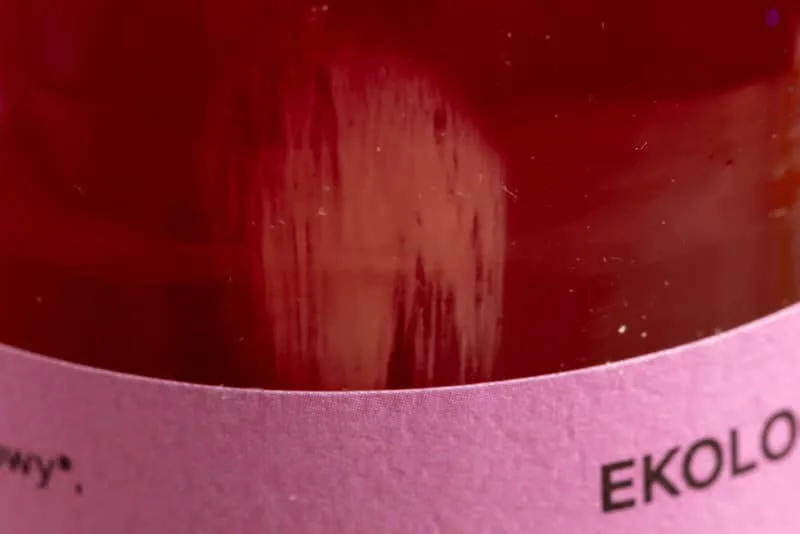
Summary
- Kombucha doesn’t go off quickly, but if there’s mold, it tastes like vinegar, or smells off, it’s time for it to go.
- The gel-like substance forming in the bottle is safe for consumption and doesn’t make the liquid bad or spoiled. If you find it gross, filter it out.
- This probiotic drink is a living thing, so its flavor, amount of bubbles, and how long it tastes good differs between batches. Even if you buy it only from one producer, the kombucha you get will be slightly different every time.
- Store kombucha refrigerated at all times unless the label says otherwise.
- If it doesn’t show any signs of spoilage, it’s most likely okay to drink, even if it’s a couple of months after the date on the label.